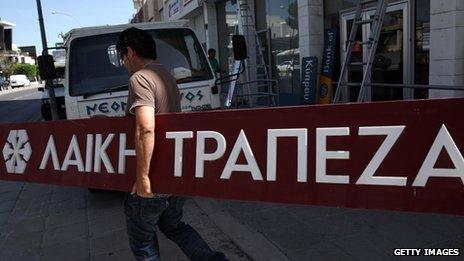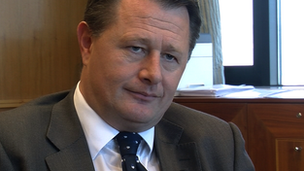Cyprus economic crisis: 'Still recovering' one year on
- Published
Nigel Cassidy returns to Cyprus to see how the country is faring a year after tough bailout measures
They may have painted out every single sign on the large abandoned bank building up for sale in the centre of Nicosia, but a year on from a chaotic 10bn euro ($13.9bn; £8.4bn) EU and IMF bailout - nobody has forgotten the name of Laiki.
Laiki was the failed bank at the heart of the financial woes of the EU's most easterly island.
Its reckless lending played a large, though by no means the only, part in tipping the entire state perilously close to bankruptcy.
Walking into Eleftheria Square in the Cyprus capital, where the world's media once congregated with their lorries and satellite dishes, there's a smart new café and a few elderly gentlemen swapping stories on the wooden benches.
Yet things have changed more radically behind the scenes in banking and political circles. For a start, Laiki's business has been transferred to the larger Bank of Cyprus, which is getting to grips with its daunting financial legacy.
About half of all remaining loans are said to be in default.
Offshore and regional financial services are starting to thrive again and new business registrations are well up.
However, the pure banking sector is thought already to have shrunk by half. Most think that's a good thing, though for all of that, the business model of the country has not significantly changed.
There's now even more talk about a future bonanza from recent gas discoveries, but financially benefiting from such finds will be hard without some kind of settlement with the Turks who patrol the waters adjacent to occupied Northern Cyprus.
Bail-in, not bailout
For Cypriots in the south, the only good part of the anniversary is that they have got through the last year - and there's a busier summer tourist season in prospect.
Nobody wants to dwell on the times when long queues snaked round the streets as families tried to get their hands on enough money to buy food or keep their businesses supplied.
With hindsight, its politicians might have saved the day at less personal cost to their citizens had they acted on warnings in the good times to curb the appetite for cheap euro loans.
But the EU's fifth financial rescue mission of its kind was different from all those which had gone before. It wasn't a bailout - it was the first rescue we heard described as a bail-in.
When it came to the crunch, Cyprus had no choice but to accept rescue terms that affected not only bank bondholders and shareholders - but many thousands of private deposit holders.
Their cash or savings were simply scalped and went to help fund the closure of one bank and the propping up of others.
The so-called "haircut" imposed a year ago was hastily designed to fall on those with large sums in offshore accounts.
They were hit hard, yet thousands of Russians still have businesses or second homes on the island and the talk is that more are returning.
But the moves to take around half of all deposits over 100,000 euros in affected banks did not always hit their target.

Laiki Bank was wound up as part of the rescue deal
'Lifetime of graft'
Nobody in Cyprus likes to talk about what they lost. Yet a year on, the anger has not subsided.
To take just one example, the last 12 months have been torture for 60-year-old Panikos Demetriou, a British Cypriot who lost more than half his savings from a lifetime of factory work.
His 80,000-euro losses were compounded because prior to its forced takeover, Laiki Bank failed, or forgot, to put some of the family's cash solely in the name of another family member, as he had requested.
Mr Demetriou is trying to make the best of his retirement in the coastal town of Larnaca, but he depends on financial support from his Greek partner.
"You sit down after a lifetime of graft at 60, and find half of all you worked for has gone. I thought I would be comfortable and a lot of the money could also have gone to my son," he says.
"This wasn't dirty Russian cash - it came from my solicitor after the sale of my house."
Overall, the ensuing business recession has not been quite as deep as forecast by economists. But the jobless toll in finance, construction and retail has been high.
Although some older Cypriots still seem to blame Germany or the EU for their plight, most now acknowledge they took too much notice of populist politicians who failed to take hard decisions.
Rebuilding trust
Finance Minister Harris Georgiades says the big lesson from Cyprus is that measures to prop up banks, and indeed entire countries, are only going to be more painful for citizens if they are postponed and then rushed.
"Fury (on the part of the EU) might seem reasonable, but if a bail-in is applied without a coherent framework, it is going to be very problematic," he told the BBC.

The Bank of Cyprus was trying to do too much in too many places, says John Hourican
"There have been many injustices, and we are still trying to recover from the repercussions."
The man charged with returning the enlarged Bank of Cyprus to health is its chief executive, John Hourican, a senior career banker formerly with the Bank of Scotland.
He is giving himself about three years in the job to help it clear out the worst of the bad loans and concentrate on rebuilding trust with its businesses and citizens.
"The bank was doing too much in too many places. We still need to shrink the balance sheet so we can fund lending with deposits, and so the wider economy is less exposed to the bank.
"We need to make it the most important bank for the 800,000 citizens of Cyprus."
- Published19 March 2014
- Published12 March 2014
- Published11 February 2014